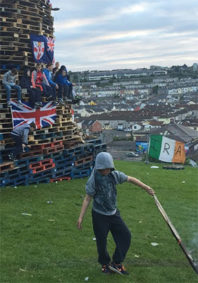
Sinead O’Shea’s documentary carefully contextualizes the events that she describes in her title. She uses inter-titles to describe a mother negotiating a punishment for her son, who the IRA accuses of selling drugs. The IRA promised to be peaceful after the Good Friday Agreement of 1998. However, that just led to the creation of violent dissident groups. They mostly advocate for Northern Ireland’s secession from Britain.
These groups also police the streets, carrying out extrajudicial punishments against people like young Philip O’Donnell. The event just adds to O’Donnell’s mental worries, being both a person with addiction who now experiences PTSD. O’Shea looks at O’Donnell’s family as well as community elders looking out for them. Both the filmmaker and her subjects nonetheless emphasize that Philip is one of the groups’ many victims.
O’Shea’s focus on the O’Donnell family is razor sharp, sitting down with them during talking head interviews. The family’s matriarch, Majella, comes off as benevolent when she’s with one of her two sons. But when O’Shea doesn’t spend time with the O’Donnells, she zooms out to Derry’s Creggan estate. The Irish tricolor fights to fly above the estate, the display showing the neighborhood’s long, bitter memories.
Majella O’Donnell’s younger and more impressionable son Kevin Barry also has a prominent presence in the documentary. Its five year filming period shows him mellow out slightly and turn into a different, older person. Originally loud and boisterous, Kevin Barry also listens to Philip bringing news like neighbors committing suicide.
The movie reminds us that adolescents are growing up in a place where suicide is epidemic. This and other factors make Majella and her sons stop answering O’Shea’s request to film their lives because. Despite that, this is one of the few cases where a doc reveals the mental side of political trauma.
- Release Date: 10/20/2018

